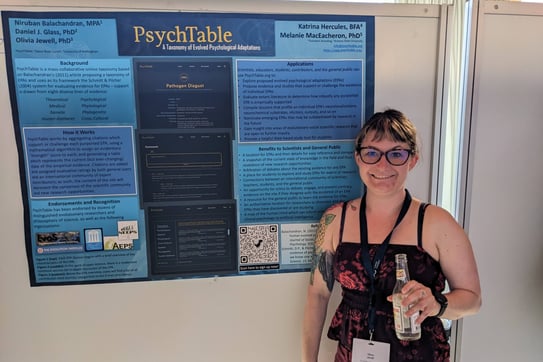Publications and Presentations
Explore my research projects and presentations in evolutionary psychology and with PsychTable.
Papers:
Jewell, O., Stewart, L., West, K., and Launay, J. (in press) You don't know what you've got till it's gone: What do choir members miss when they can no longer sing together? Musicae Scientae
Summary: Research examining participation in community choirs suggests that group singing provides choir members with benefits including emotion-regulation, increased positive affect, and reduced stress, as well as social benefits like feelings of support, trust, safety, and bondedness. During the COVID-19 pandemic community choirs were forced to discontinue in-person rehearsals to avoid spread of the virus. The current study focuses on one such community choir in London, U.K, which moved from an in-person format to an online format during the pandemic. Interviews were conducted with ten members of the choir, five of whom continued participating in online rehearsals and five of whom did not. Interviews were analyzed using Thematic Analysis to explore the aspects of in person choir participation that were most missed as well as the aspects that couldn’t be satisfactorily replicated online. Participants explicitly mentioned that they missed being able to blend their voices with others and reported that that singing in the physical presence of the rest of the choir was more powerful than what they experienced online. While some participants continued with these online rehearsals, others did not, potentially because they missed in-person elements of the choir enough that they lost motivation to take part online. The results of this study highlight the unique value of choir rehearsals taking place in person and suggest that there are fundamental aspects of group singing that cannot be reproduced in an online context.
Geher, G., Betancourt, K., Jewell, O. (2017) The link between emotional intelligence and creativity. Intelligence, Creativity, and Personality, 1-18 10.1177/0276236617710029.
Summary: Empathic accuracy, or the ability to accurately know the emotional states of others, is a basic aspect of emotional intelligence. The current study explored the relationship between a standard measure of emotion-detection ability, the reading the mind in the eyes test, along with spontaneous measures of creativity (as well as the Big Five personality traits). To measure spontaneous creativity, participants were asked to come up with brief captions for two New Yorker cartoons. Three independent judges rated all captions along 10 continuous creativity dimensions. Participants also completed Gosling’s brief measure of the Big Five. In a sample of 265 adults from around the world, the reading the mind in the eyes emerged as significantly and positively predictive of 9 of the 10 creativity indices. Regression analyses demonstrated that these relationships existed after controlling for gender and age of participant. Further, of the Big Five traits, conscientiousness emerged as negatively related to several indices of creativity. Implications for the relationship between social-perceptual processes (e.g., empathic accuracy) and social-productive processes (e.g., spontaneous creativity) are discussed.
· Geher, G., and Jewell, O. (2017) Review of: Out of Eden: the surprising consequences of polygamy. The Quarterly Review of Biology, 92, 322-323
Summary: This book review discusses some of the cultural and biological ways that ancestral polygamy has shaped aspects of behavior in modern humans. The author’s evolutionary approach to understanding humans as a polygamist ape helps pull together seemingly disparate elements of human relationships under one explanation.
· Jewell, O. (2018) Advanced Tools of Neanderthals in Shackelford, T., K., Weekes-Shackelford, V., A. Encyclopedia of Evolutionary Psychological Science. Springer, US.
Summary: This article begins by discussing techniques for early toolmaking and examples of the current evidence that tools were used at neanderthal sites. The article also discusses the controversy surrounding whether tools found at Neanderthal sites had been made by Neanderthals independent of interactions with modern humans or if they used tools made by migrating modern humans.
· Jewell, O. (2018) Bipedalism in Shackelford, T. K., Weekes-Shackelford, V. A., Encyclopedia of Evolutionary Psychological Science. Springer, US.
Summary: A brief article discussing the potential origins of bipedal locomotion in homo sapiens. The article discusses several different theories for bipedal locomotion such as predator avoidance, thermoregulation, arboreal locomotion, and food-gathering.
· Jewell, O. (2018) Extinction of Neanderthals in Shackelford, T. K., Weekes-Shackelford, V. A., Encyclopedia of Evolutionary Psychological Science. Springer, US.
Summary: This article begins with a discussion of Neanderthal morphology and how they were anatomically different from modern humans. Evidence for a variety of different explanations for neanderthal extinction are discussed. These include climate change and increasing temperature in parts of Western Europe, competition with modern humans, and assimilation into the human population.
· Jewell, O. (2018) Western Europe in Shackelford, T. K., Weekes-Shackelford, V. A., Encyclopedia of Evolutionary Psychological Science. Springer, US.
Summary: A brief encyclopedia article which outlines the migration of homo sapiens into areas of modern-day Western Europe. The article discusses potential timelines and geographic routes taken by humans into various parts of Western Europe and discusses the available evidence of human habitation in these areas.
Presentations:
Jewell, O. (2024) Psychtable: A taxonomy of evolved psychological adaptations [poster presentation]. Presented at the 2024 HBES conference, Aarhus, Denmark.
Jewell, O. (2021) The Ancestor’s Trail: a journey through time [Seminar talk]. Evolutionary Psychology Seminar, New Paltz, NY
Jewell, O. (2018) Detecting Emotions in Music. Presented at the 12th NEEPS conference, New Paltz, NY.
Betancourt, K., and Jewell, O. (2017) Creativity and emotional intelligence. Presented at the 11th NEEPS conference, Binghamton, NY.
Jewell, O. (2017) I like big butts and I cannot lie: Evolutionary perspectives on waist-hip ratio. Presented at the Humanists of the Hudson, New Paltz, NY.
Betancourt, K., and Jewell, O. (2016) Creativity and emotional intelligence. Presented at the second EPIC conference, New Paltz, NY.


Contact Me
For inquiries about my research, teaching, or the PsychTable project, please use the form below.
